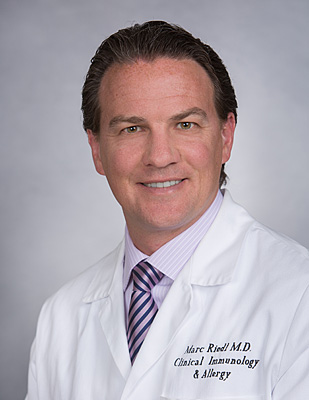First Angioedema Treatment Center Opens at UC San Diego Health System
Published Date
By:
- Jackie Carr
- Christina Johnson
Share This:
Article Content
UC San Diego Health System in partnership with the U.S. Hereditary Angioedema Association (HAEA), a non-profit patient advocacy organization, has opened the nation’s first dedicated center for diagnosing and treating diverse forms of swelling, known collectively as angioedema.
The U.S. HAEA Angioedema Center at UC San Diego Health System will serve as an international referral center for people with all types of angioedema and will work closely with basic science laboratories at UC San Diego School of Medicine to better understand the condition and develop new treatments.

Bruce Zuraw, MD, UC San Diego Health System
“The opening of this Center is an incredible step toward building a national center of excellence for the diagnosis and treatment of angioedema,” said Bruce Zuraw, MD, professor of medicine, the Center’s director and the inaugural recipient of the U.S. HAEA Endowed Chair at UC San Diego. “With our research and clinical expertise and partnership with the U.S. Hereditary Angioedema Association, we can improve patients’ lives, save lives and ultimately find a cure.”
Physicians at the Center will offer comprehensive, holistic approaches to angioedema, emphasizing the importance of educating patients, families and the medical community about the condition in all its forms. Using the latest therapeutic tools, physicians will ensure that patients are correctly diagnosed and will then use novel therapies to treat and prevent acute swelling events that occur sporadically, often without clearly identifiable triggers, which may be life threatening.

Marc Riedl, MD, UC San Diego Health System
“The disease may be misdiagnosed as a food or medication allergy, a bowel disorder or a gynecological condition, leading to unnecessary surgeries or even death if a patient has a swelling attack in the throat,” said Marc Riedl, MD, associate professor of medicine and the Center’s clinical director.
The best understood form of hereditary angioedema (HAE) is caused by a lack of a blood protein, known as a C1-inhibitor, which helps to prevent the leakage of fluid from blood vessels. There are two hereditary forms of C1-inhibitor deficiency, one associated with insufficient production of the blood protein, the other with a dysfunctional protein.
Children of an affected parent have a 50 percent chance of inheriting the disease and hereditary angioedema is thought to impact one person in 50,000, suggesting that there are more than 6,000 affected individuals in the U.S. Because the disease is so rare, people with the condition often go undiagnosed or misdiagnosed for years.
In addition to hereditary angioedema due to C1-inhibitor deficiency, there are other forms of hereditary angioedema with normal C1-inhibitor as well as acquired forms of angioedema that have been described but are much less understood. One of the major goals of the center is to develop accurate diagnostic and therapeutic options for people with these poorly understood forms of angioedema.
“A first step in helping any person with a rare disease is to confirm the diagnosis,” said Riedl, who is also a member of the U.S. HAEA’s medical advisory board and co-author of its recommendations for the management of hereditary angioedema. For the majority of patients, this can be done with a blood test.
“Once the diagnosis is confirmed, we take a comprehensive look at the patient, his or her circumstances and then discuss what treatment options make the most sense,” Riedl said. “This may mean selecting medications or modifying other factors in their life but what we really want is to optimize care so people can get back to their normal lives as much as possible.”
Besides helping patients get properly diagnosed as early as possible, a driving factor for establishing the center is to consolidate the expertise now needed to navigate rapidly evolving treatment options for the disease.
There are currently five different medicines available in the U.S. to prevent or treat acute attacks of hereditary angioedema. All of these medicines have been approved by the FDA since late 2008. Before then there were no targeted therapies for people with the condition.
Several of these treatments are approved for intravenous or subcutaneous self-administration, enabling people with the condition to avoid emergency room visits or hospital stays during acute swelling attacks. There are also several new medications in clinical development that show promise for safely preventing attacks. In addition, there are non-pharmacological approaches.
“The treatment options have expanded dramatically over the last few years, which has been good for patients,” Riedl said. “But it has also made the treatment much more complex. Our Center can help patients sift through the options and really make the right decision for them.”
The researchers are also working on developing more accurate diagnostic assays to better guide treatment plans for rare forms of angioedema. “We also have a strong interest in the complex genetics of hereditary angioedema and how this may affect the severity of symptoms as well as response to medications,” Riedl said.
“Beyond that, we are very interested in curing this disease, whether it's through gene therapy or other methods of improving the intrinsic production of the C1-inhibitor protein that’s missing in hereditary angioedema, though this is a ways off,” he added.
“The U.S. HAEA Angioedema Center is committed to providing an integrated approach to the care of angioedema,” said Sandra Christiansen, MD, a member of the U.S. HAEA Medical Advisory Board. “Our focus is to lessen the burden of disease and ultimately normalize the lives of all angioedema patients.”
The new U.S. HAEA Angioedema Center is located at 8899 University Center Lane in University Towne Center. Appointments may be made by calling 800-926-8273.
About Angioedema
Angioedema (swelling) may involve almost any area of the body but most frequently affects the hands, feet, stomach or genitals. During attacks, patients are frequently unable to engage in normal life activities. Stomach attacks may lead to hospitalization for severe abdominal pain and vomiting and patients have undergone unnecessary abdominal surgery due to misdiagnosed angioedema attacks. When swelling occurs in the throat area, patients may be unable to breathe. These attacks can be fatal. About half of all patients experience their first attack before age 10. Attacks, however, can begin as early as infancy. What triggers the swelling attacks is largely unknown.
About the U.S. Hereditary Angioedema Association
The U.S. Hereditary Angioedema Association is a non-profit, patient advocacy organization, dedicated to serving people with all types of angioedema. The association provides patients and their families with a wide range of services, including physician referrals, emergency assistance and personalized patient support. Founded and staffed by people with hereditary angioedema and their caregivers, the association is committed to raising awareness about angioedema and advancing clinical research that can improve the lives of people with the condition and ultimately lead to a cure.
Share This:
Stay in the Know
Keep up with all the latest from UC San Diego. Subscribe to the newsletter today.



